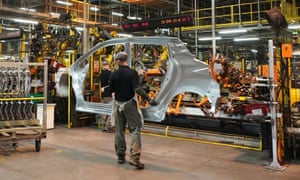Temporary shutdown at Sunderland plant caused by disruption to supply chain during pandemic

Workers at Nissan’s factory in Sunderland where one of two production lines has been paused.
Photograph: Owen Humphreys/PA
Nissan has been forced to shut one of the two production lines at its Sunderland factory as it faces supply delays caused by the coronavirus pandemic.
The UK’s biggest car factory has paused production of its Qashqai crossover SUV and its electric Leaf car, with the aim of restarting on Monday. The factory also produces the Juke model.
A Nissan spokesman said: “Production on line one at the plant has been paused due to supply chain disruption caused by the Covid-19 pandemic. We anticipate that production will resume on Monday next week.”
The temporary shutdown is the latest in a series of issues that have affected carmakers in recent weeks. Before Christmas, companies including Honda and Jaguar Land Rover halted some production, in part because of delays at ports disrupting the import of parts.
Shipping companies blamed Brexit stockpiling for adding to delays before the new year, but the last-minute free trade agreement struck on Christmas Eve between the UK and the EU meant the car industry avoided the immediate imposition of tariffs or quotas. Carmakers including Nissan had warned that a no-deal Brexit would have been catastrophic for the industry in the UK.
Carmakers have also had to contend with global shortages of computer chips, causing production shutdowns around the world. Honda’s Swindon plant was among those affected.
Nissan’s Sunderland plant, which employs about 6,000 workers, produced 366,000 cars in 2019 but is thought to have the capacity to build as many as 600,000.
Production fell sharply during 2020 when Nissan and every other European carmaker closed their doors for months from March as they assessed how to implement safety measures during the pandemic. The factory is not running at the weekends and does not have a third shift running on either line, giving it the scope to increase production.